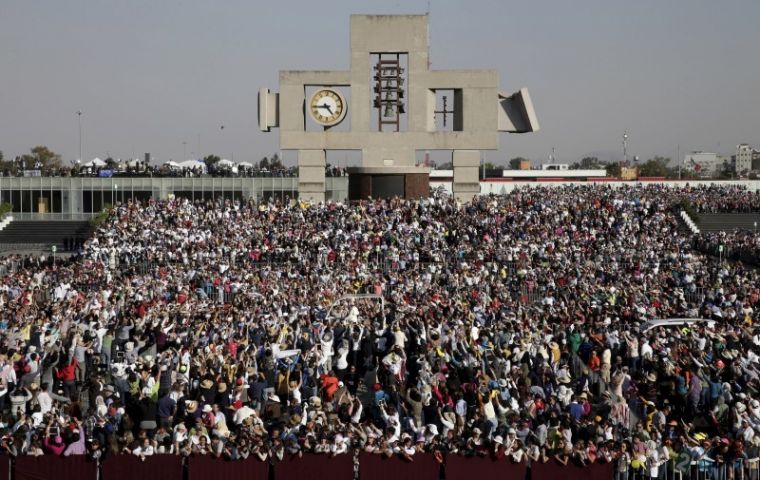300,000 hear Pope Francis slam Mexico's rich and corrupt elite

Celebrating Mass for more than 300,000 people in one of Mexico´s poorest and most dangerous cities, Pope Francis on Sunday took a swipe at the country's rich and corrupt elite .
Decrying "a society of the few and for the few", he denounced deep inequality and the vanity and pride of those who consider themselves a cut above the rest.
"That wealth which tastes of pain, bitterness and suffering. This is the bread that a corrupt family or society gives its own children," the Pope said at the Mass in the city of Ecatepec.
Francis urged his listeners to struggle to make Mexico "a land of opportunities where there will be no need to emigrate in order to dream" and where drug traffickers, whom he called "dealers of death", would not ensnare their children.
Mexico is home to one of the world´s richest men, billionaire Carlos Slim, and a wealthy political class stained by corruption even as much of the country is steeped in poverty and violence.
A gritty expanse of cinder block homes north of Mexico City, Ecatepec has seen a surge in crime in recent years as it became infested with warring drug cartels.
Fueled by a weak economy and youth unemployment, gang violence has driven the city's murder rate to one of Mexico's highest.
It is notorious for the unsolved murders of scores of women, the bodies of many found abandoned in garbage dumps or tossed in a canal only miles from where Francis spoke on Sunday.
'No dialogue with the devil'
The Pope warned Mexicans not to succumb to evil: "You cannot dialogue with the devil because he will always win," he told them.
Ecatepec is home to a giant statue of "Santa Muerte", or Saint Death, a cult figure followed by millions across the Americas.
The saint is often depicted as a skeletal "grim reaper" draped in white satin robes, beaded necklaces and carrying a scythe, and is believed to grant requests without judging people.
Although he did not address Santa Muerte in his Mass, the Roman Catholic Church has been dismayed by the cult's rise at a time it is battling competition from other religions.
"The Mexican Church already was very concerned by expanding Protestantism and now it must contend with a folk saint venerated mostly by Mexicans who still consider themselves Catholic," said Andrew Chesnut, the author of a book about the cult.
A sea of Catholic faithful greeted the Pope as he flew into Ecatepec aboard a white helicopter, many wearing T-shirts emblazoned with his image, chanting, cheering and waving flags. Tens of thousands of others lined the streets.
"We are living through a period of great violence ... May [the Pope] give us strength to continue to bear this, to keep struggling against it," said Maria Dolores Angeles Martinez, a 26-year-old housewife from Ecatepec.
Across the country, more than 100,000 people have been killed in drug violence over the last decade and some 26,000 are missing.
President Enrique Pena Nieto has failed to significantly curb the bloodshed, with murders rising last year after falling early in his term.
Before becoming president, Pena Nieto was governor of the State of Mexico that is the home to Ecatepec. In the second half of his 2005-2011 term as governor, the murders of women doubled.
Corruption and incompetence are rampant in under-funded police forces across Mexico. The vast majority of murders are never solved and family members complain authorities show little interest in the cases of the missing.
Francis condemned corruption in a hard-hitting speech at the presidential palace on Saturday.
Unlike his predecessor Pope Benedict, who visited Mexico's conservative heartland in 2012, Francis is stopping in some of the country's most troubled corners on his first trip as pontiff.
He will travel on Monday to Mexico's poorest state Chiapas, where he will say Mass with indigenous communities. Evangelical Christian groups have made huge advances in Chiapas, weakening the Catholic Church's influence.
The pope will also meet with young people in Morelia, the capital of Michoacan state where drug gangs and armed vigilante groups have waged a bloody conflict.
He then concludes his trip in the notorious northern border city of Ciudad Juarez, where he will address the tide of illegal immigration into the United States, meet relatives of victims of violence, and visit a prison.











